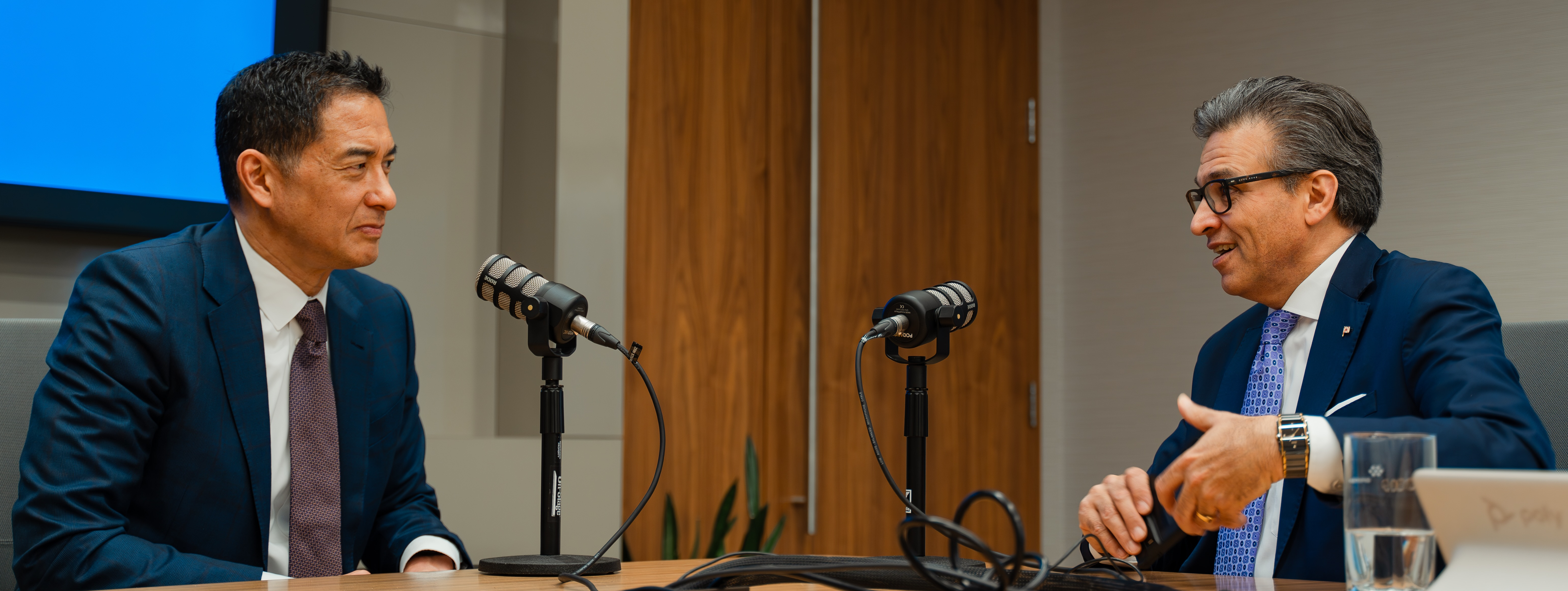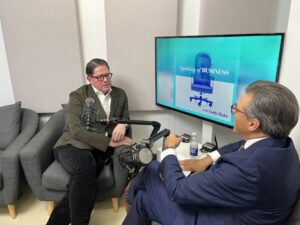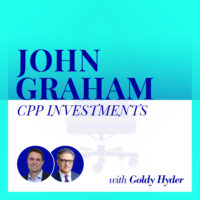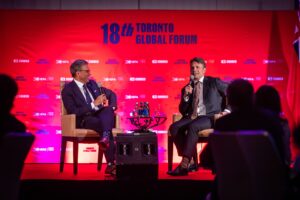Geoff Smith is CEO of construction juggernaut EllisDon. The company’s projects include Rogers Centre, the Art Gallery of Ontario and countless other public and private facilities across the country. Our fascinating conversation covers succession, disruption, politics and how Geoff and his team brought the company back from the brink with a employee-driven, values-based strategy.
“We have created a really great place to work , and I think that gives the company more purpose – for me – than the buildings themselves.”
Geoff Smith
Goldy Hyder:
Welcome to Speaking of Business Conversations with Canadian innovators, entrepreneurs and business leaders. I’m Goldy Hyder, president and CEO of the Business Council of Canada. Today I’m speaking with Geoff Smith, CEO of construction, juggernaut Ellis Don. The company’s projects include Rogers Center, the Art Gallery of Ontario, and countless other public and private facilities across the country. I’m sure you’ve seen their signs. Our fascinating conversation covers succession disruption, politics and how Geoff and his team brought the company back from the brink with an employee-driven values-based strategy. Enjoy. Well, Geoff, thanks for doing this. Really good to see you.
Geoff Smith:
Pleasure to see you.
Goldy Hyder:
Where do we begin with a company like EllisDon, a sign that people see all across Canada. What is EllisDon? Who is EllisDon?
Geoff Smith:
Well, first of all, it’s a company with very big signs. Yes,
Goldy Hyder:
Clearly
Geoff Smith:
It’s just a bunch of people and I mean that in the most sincere way that I can. We don’t have any exclusive intellectual property. We don’t know things that other people don’t know. A lot of people think, well, there must be some big brain trust there. We’re really just a group of people trying to do our best. That’s the way I describe ourselves to the employees actually, especially after we screw something up. It’s a team of people who love building and who love business.
Goldy Hyder:
And was that love for building something that was always in you, given the fact that this is a family business, it started with your father and your uncle, or is it the kind of thing where you said, I’m not going to do that?
Geoff Smith:
Well, so first of all, you notice I added and who loved business because I’m actually not a builder and I don’t particularly love the details and engineering of construction and everybody who works at EllisDon knows that I love the business of EllisDon. I love doing deals I love, and I think people who work here know this too. I love and respect the kind of people who work here. So I love what I do for a living. They also know that I can’t build anything. I couldn’t build, as I say, a house with a deck of cards. You weren’t
Goldy Hyder:
Very good with Lego, were
Geoff Smith:
You? Terrible And MEChA, everybody goes. Everybody has MEChA. I never had a MEChA set, never wanted one. When I walk onto a job site, people are worried I’m going to hurt myself. But most other people here obviously love building. The accountants here love accounting, and the lawyers here love lawyering. Even though we hopefully don’t have too many lawyers, we’ve got some really good ones. So it’s about loving what you do, whatever it is. Clearly most people love building.
Goldy Hyder:
How do you make up for that gap? Obviously you need to have some passion for the construction industry, for infrastructure, and for building it. Can’t just be doing deals all day long. No,
Geoff Smith:
Listen, I’m mean when I say, and I mean no disrespect all the lawyers I used to hang out with earlier in my career, but construction people are the best people. You can still do deals in construction on a handshake and on a napkin with your clients, with your subcontractors and with your employees. Every day is different and every day is a different challenge. So if you enjoy people and working with people and doing something different every day, you’re going to love this business. And the people at Ellis Don, I don’t think, well, most of them stay here a long time. Mine that gap with me, they just accept that I can’t do what they can do.
Goldy Hyder:
Let’s talk about your journey here because it wasn’t a straight line.
Geoff Smith:
No, it was pretty crooked line.
Goldy Hyder:
Take us through that.
Geoff Smith:
Well, so I was never going to join the family business, like never. And you’ll probably ask me about my dad in a little while and I’ll explain why. Much as I loved him, I wasn’t sure. I thought I’d go into business. I actually thought I’d be pretty good at it. I also thought I could change the world and be a great litigator and maybe be Clarence Darrow or somebody like that. So I was torn and eventually I went to law school, got me further away from the family business, thank goodness they offered me, the firm that I articled with offered me a job doing matrimonial law, which I thought was the worst thing ever. And still
Goldy Hyder:
Speaking of construction. Yeah,
Geoff Smith:
Still think that yeah, if you want violence and swearing, matrimonial law is a good place to start. So I didn’t take that job. I thought, well, I’ll go into corporate law. And I did that for literally less than a year. And what I found is that I’m not very good at that. And I think I’m not very good at that because I think I have attention deficit issues. I mean that seriously, I can’t get through a shareholder’s agreement. I can’t sit through a meeting where other people are negotiating terms that I’m expected to write them down and capture them all. So after about a year, I said, okay, this isn’t working. I got to go back into litigation somehow. But I thought I’d go into business. The reason I joined the family business that I had sworn I would never do is that the great thing about Dawn from the beginning, and this came obviously a hundred percent from my father, one of the only pure entrepreneurs I’ve met in my entire life was he would throw all sorts of responsibility at you really quickly. So if you wanted to get into it, get into it fast at a young age, still in your twenties, that was the place to go. It wasn’t the place to stay. It was too much upheaval all the time, but it was a great place to start. So I said, okay, let’s go.
Goldy Hyder:
Now the dawn in Ellis, Dawn is your dad. That’s right. And Ellis is your dad’s older brother.
Geoff Smith:
Yes. That’s exactly right.
Goldy Hyder:
And do you think you’re more like your uncle than your dad?
Geoff Smith:
No, I’m not like my uncle at all, much as I loved him and he was my godfather, but he was an engineer and he was a straightforward construction person and a very logical, he was a good builder, not a great business person. So I don’t think I’m like him, and I don’t think I’m very much like my father either. So there you go.
Goldy Hyder:
My father’s my hero and my father shuttered a business as well, and I swore I’d never go into the family business. And sure enough, I did for a period of time and a lot of it had to do with me less so to do with him. But I’m curious, your father was a larger than life figure in Ontario and Ontario politics and in the business community, and please don’t take this the wrong way, and I say this with great respect to him is there was a bit of Donald Trump in him. There’s stories about how he was just an aggressive businessman and if he would walk onto a site and if he didn’t think you were up to the job, I think his words weren’t quite, you’re fired, but you’re out with a thumb.
Geoff Smith:
No, that’s exactly, yeah. You’ve done your homework. When I was 10 years old, here’s a story, or I think I was probably 12, a friend of mine whose father was in the development construction business of London, London, Ontario, and he said, your father will walk onto a job site and fire everybody on the job site. I said, I’m 12. I’m pretty much on top of things. I said, well, that’s just stupid. Nobody would ever do that. That’s crazy. Makes no sense. Anyway, I went home that night and said, I just heard this story that you’ll fire. You’ll walk onto a job and fire everybody on the site. And he said, sometimes you got to shake things up. Who does that? Well, my dad does that, right?
Goldy Hyder:
And it worked for him.
Geoff Smith:
You know what? It worked for him to a point. So you would go to work, as I said a few minutes ago to Ellis Don, and you would work there for two or three years and you’d be young and you get lots of great training. And then you would either quit or you would get fired and mostly you would get fired. He would bring you up, he would put you in over your head and then he would fire you. He got a lot of great energy and a lot of great work out of a lot of very young people. And he did some really terrific things like build skydome. Now, Rogers Center, we’ll get to that. But I also think it really limited his growth. I think he lost a lot of really good people that frankly went to our competitors, that built great companies on their own. So it worked and it didn’t always
Goldy Hyder:
Work. And is that why you take the approach that you do now?
Geoff Smith:
You said a minute ago, Goldy, that your father was your hero. I got along for the most part, except when I didn’t. I got along mostly in my life, well with my father and I learned a great deal from him. He used to say to me when we were fighting, and we’ll get to that probably you’ll never make it in construction. You’re too much like your mother. In other words, you’re a mama’s boy. And I would say to him, I’ll wear that badge proudly. My mother was my hero. My mother was a thinker. She was calm, she was extremely intelligent. She was very active in the community. She was very people oriented. She used to make me stop and think more than anybody else ever did. So my mother was my You a big family, six siblings, seven of us, yeah,
Goldy Hyder:
Seven of you. And how many are in or were in the business?
Geoff Smith:
At one point there were six of the seven in the business. Only my eldest sister Kathy, managed to fully escape the clutches. So at one point, there’s
Goldy Hyder:
Reason she’s the older one
Geoff Smith:
At one point. Yeah, she got all the brains. At one point there were six of us. As of right now, there’s only two.
Goldy Hyder:
Now you had a period in which you left the company.
Geoff Smith:
That’s right.
Goldy Hyder:
Take us through that experience.
Geoff Smith:
So listen at home, it was a big raucous family. It was lots of fun. My parents were both working very hard. They were early there. There were seven of us. We had a blast. When my dad was there, he was terrific. I had a great home life at work. Once I got into a position of authority, I ran the Western Canadian operations for a while, and then I was president, chief operating officer. Not so good. Why? He’s a very strong-willed sort of a guy, and he wants to be in control and it’s his company. Me, I was a bit immature, I’m sure maybe a lot coming up, very ambitious, wanting to take over and take the reins. So I don’t think I was thoughtful enough about what he wanted and what he needed. And I don’t think, frankly, he was thoughtful enough about what I wanted and what I needed to enable us to work together.
So we fought like the dickens, and it was a tough time. It was the early nineties. All of our clients went broke. They all went broke bra, the tri, oh, and Y, et cetera. So it was a tough time and we were just fighting. So finally I was 40 and he was 70. And I said, one of us has got to go. And he said, well, that won’t be me. So I said, oh, okay. Well then I guess it’s me. I guess it’s me. So in the summer when I was turning 40 years old, I left. I just walked out.
Goldy Hyder:
And then you came back.
Geoff Smith:
And then a year later I came back and the company, what happened was the fellow that he put in my place that didn’t work out so well,
Goldy Hyder:
Non-family member,
Geoff Smith:
A non-family member. And then that guy tried to buy the company from Don. He thought he could put together the financing to do it, and he had a deal and it was all set up to close in late summer in 1996. And at the last second, the deal fell through. He didn’t have the financing, he couldn’t do it. He and my father were obviously not getting along. And so there was a family friend, a good friend of my dad’s had been helping him through this whole process, called me up and said, you got to come back. And I can tell you it was a very stressful period both on my own home front and on all fronts. But I went back.
Goldy Hyder:
And how did it work? The second go around, what did you do differently? For example, Linda has in France tells a great story from Lenmar about how she has with her father a posted agreement of four things that he’s going to do and everything else she gets to do. And every time he intervenes, she pulls out the post-it. Do you have a post-it that you used or how did you go,
Geoff Smith:
No, here’s how it worked at all this time. Good for Linda. I wasn’t able to get that far. My dad, as we said earlier, he was too much larger than life. He was too much the guy. And I said, I’ll come back, but he’s got to go. So he retires. He’s out of the building, he doesn’t get to come back in the building and I will come back. How do you
Goldy Hyder:
Feel about that? Deep down, it was
Geoff Smith:
The only way it was going to work. I don’t feel bad about it at all because the company was on the verge of failure at that point or was maybe six months out. But it was coming
Goldy Hyder:
Situationally or because of him?
Geoff Smith:
Partly it had been a very tough time, but partly it hadn’t been well managed. A lot of good people had been chased away. We had this resort in the Caribbean, which was busy sucking all our cash, partly because of me. I expanded into the US before I left. That was a losing operation. So I don’t want to duck my own responsibility here. I definitely had some, and as I said before, the fight was two people fighting. Nobody’s innocent. So I don’t want to, I’m not going to blame him, but I’m not going to give him any credit either. He was the CEO. But no, I don’t have any regrets to come back to that. That was literally the only way we could do it. Did it cause some bitterness? Yes, it did for a while, but my brothers and sisters and I all had to go to the bank and borrow money. Personally, there wasn’t a lot of money around. And so that meant our houses were on the line and they backed me. They realized that if you’re going to make a change, there had to be a change.
Goldy Hyder:
Was it hard to shake the legacy? Did you find that people were still doing the comparison or your dad wouldn’t have done it that way? How did you deal with that?
Geoff Smith:
I honestly didn’t worry that much about that because for the first two years we were just trying to stay in business. The legacy that was hard to shake was the reputation that Ellis Don was too tough, too hard a company. Our clients, especially in Ontario, didn’t like us. The subcontractors didn’t like us. We had this leadership gap that was causing all sorts of confusion in the marketplace. So for the first two years, it was just about trying to save the company. I used to say, when you come back from lunch and your desk is on fire, you don’t need to worry too much about setting your priorities. We had a cashflow crisis. We were out of cash and I was trying to keep the employees from leaving. Our competitors were trying to steal all our good employees. So there was a lot to worry about other than that,
Goldy Hyder:
Well, I think it’s safe to say your mom would’ve been very proud of you or is very proud of you. It’s your dad.
Geoff Smith:
By the end, and let me say a year or two or three pass, once the company really started to turn around, he and I started to get along a lot better. Did
Goldy Hyder:
Ever say to you, Geoff, I’m proud of
Geoff Smith:
You? He said it to me and he said it. More importantly, he said it to a lot of other people.
Goldy Hyder:
Yeah, that says a lot. Given his character in what he is been described as,
Geoff Smith:
It does say a lot for him. And my dad was nothing if not an honest guy. So at least when he was saying bad things about you, you knew he meant it. When he was saying good things about you, you knew he meant it. So it did mean a lot. Well,
Goldy Hyder:
That’s good. Good to hear. Thank you for sharing that with us. I think it’s important that people know what makes you who you are, and part of it is that journey. So let’s talk about leadership. Let’s talk about leadership and what you think leadership is and what makes for a good leader.
Geoff Smith:
So I come by my views on leadership, honestly, as we’ve described, I don’t know anything about construction. I have to tell you a quick story. That’s one of the most important things for me. After about two years when we knew the company wasn’t going to go broke, after I’d come back and I finally had a chance to sit back and think about things, one of the things I realized was that none of the really core people at Ellis Dawn, none of the people at the company needed if it was going to survive, had left. So you have to ask yourself why didn’t they leave? And I was under no illusions that it was because Dawn or I had provided great leadership, we had done the opposite because the place was a mess for a while. So what do you do? So I went around and I asked them, I said, why didn’t you leave?
Just tell me the truth. And most of them didn’t tell me the truth. But one fellow did, a guy named Rick Omo, he said, Geoff, we all talked about it, we all thought about it. And what we decided was remember these were people who had been here a long time that we liked working together. We decided we could save the company and we decided that’s what we were going to do. So that’s what we did. In other words, and Rick’s a very modest guy, they just decided on their own that the company was worth saving and they would save it and they did. So for me, I laughed and said, do you think you might want to let me in on this? And we laughed and we’re still friends. He’s retired now. But then I realized those guys were leading every bit as much as they were guys much.
We have more women now, but back then guys, they were the leaders. So my theory of leadership is, which I get from stuff Yuri too, the Jim Collins, I’m a fan, is just get great people around you. Find a way to attract them and keep them and then get out of their way and then the company will go where it’s going to go. And frankly, I don’t really care where the company goes. I care that we have great people who have a great time, who have great values, who love working together and who can do it. So with me, we talk all the time around here about leadership is being humble, leadership is being determined, but leadership is about getting out of the way and letting somebody else lead. And for them, they have to get out of the way and let somebody else lead. So that’s my view of leadership.
Goldy Hyder:
Are you able to do that because you’re a private company?
Geoff Smith:
I have no idea Goldy, because I’ve never worked for a public company. In fact, but
Goldy Hyder:
The reason I’m asking is, I mean the public companies seem to be driven by the investor calls and the quarterly reporting. And part of leadership is long-term thinking and a vision about where we’re going. Do you have the advantage as a private company?
Geoff Smith:
I think you have a terrific advantage as a private company.
Goldy Hyder:
Have you thought about going public?
Geoff Smith:
No. For two reasons. One is exactly that. I actually couldn’t tell you what my quarterly earnings are. I have a hard enough time figuring out what my annual earnings are when you’ve got frankly 5 billion worth of buildings under construction, how much did you make yesterday? I don’t know. Nobody knows, quite frankly. So to be away from all that quarterly reporting and short term thinking is a huge advantage. We can focus. We have a strong independent board. We can focus on what needs focusing on, which is the short term, but also the long term and the other reasons you go public because you need capital either for growth or liquidity events like succession, et cetera. We don’t have those in construction. It’s a self-financing business. You can grow as big as you want. Conventionally, you don’t need capital. So we are good.
Goldy Hyder:
Good. Now, disruption is everywhere. I suspect it’s not escaping the construction industry either. How are you managing disruption in your business and what does it look like?
Geoff Smith:
Well, to me it looks like we’ve done a pretty good job of escaping it up till now. And for sure we are not going to be able to escape it any longer. It’s coming at us in all its fronts. Construction is being digitized. Construction is largely a leadership process, every part of it, plus manufacturing, plus everything. Not only is our business model as a company being turned inside out or about to be, I think the whole industry business model is breaking down or is about to break down. I don’t think it’ll look at all in five years what it looks like for the last 50. So everything we’re doing now is about getting ready for that disruption given that we do not know exactly what it will look like, how exactly it’ll play out. We don’t have a clue. But the thing about construction that’s certainly coming our way is that Silicon Valley sees a great opportunity in the construction industry because we’ve been so inefficient. So they are coming at us hard. They also want our data. So they’re giving us the software cheap partly so they can get in and take control of our core businesses. And partly so they can get our data. I intend to give them at EllisDon, neither control of our core functions or our data. How exactly we’ll accomplish that to be seen is to be seen. But we are thinking about it
Goldy Hyder:
Very hard. But in some ways, isn’t that what the business community, small or large is really facing today? As I remember at once being said that all businesses are on the journey of becoming IT companies irrespective of what you’re selling.
Geoff Smith:
And you and I have both heard people say that if you’re not turning yourself into a software company, you will be out of business. And I buy that 100%. So there is a battle going on in many industries and the battle is just being taken up in construction where the software companies want to put the legacy companies out of business. And the legacy companies such as Ellis Don are trying to turn themselves into software companies so that they don’t get put out of business. How does it legacy company turned itself into a software company? Well, as I said, it’s not that difficult. The software isn’t that hard to do. I believe that the key to our survival is our willingness to take complete risk over the entire process, which the software companies won’t do. So we have a survival strategy. We’ll see how it plays out.
Goldy Hyder:
One of the advantages I have in this position is to go across the country and meet with CEOs from all kinds of different sectors. And I ask them, what keeps them up at night? What keeps you up at night?
Geoff Smith:
So what else keeps me up at night other than the software business, right? Really two things. One is I’m more worried now than I’ve been in 20 years about the state of the world. We have not been from a purely economic basis. We haven’t had a recession in our industry for 20 years. And in construction, recessions are killers. They hit us harder than they hit more. We do better in booms than most companies, but we do worse in recessions. And the longer we go without a recession, I fear I stay awake at night deep. The worse it’s going to be, the deep it’s going to be, and therefore the much worse it’s going to be for us. So that is killing me. But then now you look out and you see the world almost throwing itself into bad times. I don’t need to tell you the whole trade and tariffs and Brexit and this whole business of just let’s polarize the whole world so that it’s all them and us, whether you’re talking about economic or racial or any other grounds that just doesn’t lead to recession, that can lead to war. I don’t think I’m being alarmist. History
Goldy Hyder:
Shows it does.
Geoff Smith:
History shows it does. We seem to be headed that way blindly and in a hurry. And I spend a lot of time not sleeping over those things. And then there’s just the whole thing about what don’t I know, I’m trying to find things to worry about. So I find it’s a scary time right now.
Goldy Hyder:
You’ve got kids. I’ve got kids. Is this a generational thing to some extent. Do you have more hope that some of the things you just described of the world steamrolling into this direction, a course correction can take place with generational change and generational leadership change?
Geoff Smith:
Well, I don’t know about that. I worry frankly that we’ve just come through the period before the first World war, 60 years of peace and prosperity, and I think maybe we’ve forgotten how dangerous things could be. I’d tell my kids that for my entire life I could never understand how Hitler was elected because he was elected at the beginning. Now, in the last three years, I’ve figured out how Hitler managed to get elected. So do I see the kids as the salvation? I sure hope so, but I don’t think it’s obvious.
Goldy Hyder:
Well, we brought the subject of family into this. Let’s talk a little bit about yours. How do you find how you’re going about and raising your kids versus how your parents had to raise you and your six brothers and sisters? Is it easy? Is it harder?
Geoff Smith:
It’s different. My dad always said that we were ruining our children because we were watching over them far too carefully. He had seven kids and let us go. He was a disciplinarian. Don’t get wrong
Goldy Hyder:
With it. Something be said for that, by the
Geoff Smith:
Way. No, there’s a lot to be said for it. I tell my kids I had a much better childhood than you did because as we all know, the baby boomers helicopter over their parents or over their kids, excuse me, a watch them far too closely. So is it different? It’s different. Is it better or worse? I don’t actually think it’s better or worse, but
Goldy Hyder:
You have hope for them. And
Geoff Smith:
I have terrific hope. I’m a short-term warrior, but a long-term, things will be fine. They’ll figure it out. We will figure out the environment. I believe that we may go through some grief before we do, but we will. And the power of technology to make people’s lives better is terrific. And we all know we’re healthier and living alone, all of that stuff. So I’m an optimist, but we’re only going to see that great day of. We worry a lot right now. I think the kids today are just fine. I don’t think they’re better or worse than we were. I think it’ll be good.
Goldy Hyder:
Now, your dad was known for making it home for dinner.
Geoff Smith:
I wouldn’t. Who told you that?
Goldy Hyder:
What I read about him says he made it home for dinner.
Geoff Smith:
Yeah, he probably said that. I never
Goldy Hyder:
Do. You make it home for dinner, irrespective of whether he did
Geoff Smith:
Or not. When my kids were growing up and my dad was generally home for dinner and he was generally home for dinner more than I was, I’ll give him that. Some of those dinners might’ve been a little calmer if he wasn’t home for dinner. But let it
Goldy Hyder:
Go, Geoff.
Geoff Smith:
Let it go. Let it go. I’m just kidding. But I also don’t think that if you ask my kids, everybody says, well, when they died, they wish they’d spent more time with their kids. Well, maybe, but their kids didn’t really want to spend all that much more time with you. And I think touche, my wife and I have figured out that balance. She wouldn’t necessarily agree with me. So luckily she’s not here. But I think we got that balance. Not too bad. I get along with my kids now.
Goldy Hyder:
Are any of them interested in the business?
Geoff Smith:
Well, three of them work. There’s three of them and they all work at EllisDon, which was not their goal or mine, different company now than it was. So different things. The company is growing. We’ve actually learned to embrace nepotism. The kids of all of our employees, not just me, the Smith family, we now encourage the kids of our employees stability to work here. Stability. We find that if you’ve got the kind of values that it takes to work here, then your kids probably do. We also find that you’re probably not going to come here and make your parent look stupid because they will kill you. So we have great experience with our kids and I finally said, well, to my kids, there’s some great opportunities here. But I did say to them, come if you like the business, do not come because you’re my kid or because this is some kind of family company because it’s going to be owned by the employees. So if you like your job, if you like the opportunity come, if you think you’re coming because of some familial issue, that would be a huge mistake.
Goldy Hyder:
You’ve been very candid about your relationship with your father. Yes. How would they describe their relationship with you?
Geoff Smith:
I don’t know actually. I think you’d have to ask them. I literally sincerely don’t know the answer to that question. I think that they would say, I am an okay guy. I hope that because we rarely fight. I think if you said, well, what was the downside? They’d say, well, the nights he did make at home for dinner, he wasn’t there all the time. They used to say, I’d be sitting at dinner thinking and they’d say earth to dad, earth to dad. So I wasn’t always the most engaged as I should have been. I was a bit distracted. But other than that, I don’t think they have real complaints. What
Goldy Hyder:
Advice do you give them now just in life, not just in business?
Geoff Smith:
Listen, the advice I give them is do not take relationships for granted. Because I think when I came out, I was too ambitious. It was too much in a hurry. I don’t think I stepped on people, but I don’t think I was always the most considerate person. I think if you are a nice person and you build up relationships and you are honest with people and you got to work hard, all that stuff, the world will unfold for you.
Goldy Hyder:
I’m really glad you said that because in one of your blogs on your website, the company’s website, I was surprised because it’s more philosophical and reflective than people might expect coming from the CEO of a major organization and a construction company. And a little while ago you were writing about how you make important decisions and about how you as a leader are going to treat people and how too often people are treated based on mistaken assumptions and motivations. What prompted you to write that?
Geoff Smith:
Well, the conviction that people, and by that I mean me and we think we know what the other person is thinking because we’re so smart, we’ve got it all figured out. So then it’s not that we want to offend you or even take advantage of you. We don’t for the most part, but we still think we know what you’re thinking when we don’t. For the most part, and I tripped over that issue about the Cuban Missile Crisis where both of the leaders, Khrushchev and Kennedy completely, they didn’t underestimate or overestimate the other. They misunderstood one another because they didn’t figure it out. And the world almost ended. You as an individual are not going to make the world end, but you could make your world end if you don’t really take the time to try and figure out what makes the other person tick. What is the other person afraid of? And the way to figure it out, I give this speech to every new employee at EllisDon is you just ask them. They may not tell you the first time, but sooner or later they’ll tell you. And if you can take care of that, they’ll take care of us. We’ll take care of each other. It is not a zero sum game.
Goldy Hyder:
Now, you’ve also written a few times, maybe one too many times for me not to pick it up, but you talk about succession, you talk about what’s next. So what is next
Geoff Smith:
For Ton you mean
Goldy Hyder:
And for you both.
Geoff Smith:
Well, my wife asked me this question. I’m not breaking
Goldy Hyder:
Any news here, are we?
Geoff Smith:
No. My wife asked me this question a year or so ago. She said, how does this all end?
Which is a very profound question. And her point was, okay, Geoff, we’ve been working for 30 years. We’ve gone through a lot of grief. We’ve come out the other side. You’re still working 67 hours a week. Is there there? Let’s enjoy this a little. Yeah. Can we not enjoy this a little? So we are trying to make some changes based on that. But I did say to her, I don’t think I can quit working. I get intellectual stimulation out of it and I’m no good when I’m just lying around the house. But I have said to the people around here, the younger the kids I call ’em, although they’re now in their forties, I will not get in your way. So you tell me if I’m getting in your way. So we’ve got a real succession going on around here over the next year. I’m going to step out of the day to day. I want to keep working on the really interesting strategic stuff. We talked about software specifically as much to let the company grow and let all the young people here do their thing and keep from getting divorced. Like there’s a lot of upside here from me personally, and I think that’s what’s next. But I don’t think that means I have to leave. I’ve said if I could hang around, that would be cool.
Goldy Hyder:
Well, that allows me to talk a little bit about what it takes to build a culture and a company. How do you even just do change management while trying to maintain the culture? Because you had to do that once yourself and now you might have to see it happen after you. What advice do you have in terms of the transition? And you said earlier to the kids, I’m assuming you meant to the next generation. Yeah,
Geoff Smith:
The 40 year olds here, although the great team we’ve built. So here’s what I’d say. You actually said a couple of things because maintaining culture and change management aren’t exactly the same thing. If you believe that the culture needs to be changed in your place, place a business place of whatever, then you need to go in and change it. And you don’t need to wait for a lot of consensus. That would be a huge mistake. You need to move fast, you need to be crystal clear and you need to repeat it to everybody in the world because they will never believe you the first 10 times you say it. And then you need to live through the moments of truth. Somebody taught me this lesson when one of the great superintendents who you really need contravenes these new values. What are you going to do if you don’t fire that person?
Your values are done. So that kind of change in culture, we did ours around values. Excuse me. So that’s how those two tie together are really important. It’s the same with change management. Do not wait for consensus. Don’t try and build it up. Explain the reasons, listen to people. Think about it, make the decision go hard because it’s going to take twice as long as you think it’s going to take anyway. Now, sorry, but around when I leave here, I obviously don’t believe there needs to be a big change. We worked very hard to build up what we’ve got here. The
Goldy Hyder:
Situations changed. I mean, you look at the advent of social digital
Geoff Smith:
Media and once I go, I’ve done everything I can. If they want to change it, they’ll change it all. But we are going to try to make sure that the values, not that the strategy stays, not that the core business stays, not that anything else stays. And we talk about values from the time you get to EllisDon till the time you’ll leave, we never stop. And the next leader, if I have a say, and I will obviously have some say, will exemplify those values and come from within. We all know you can kill values with one memo. And then I do think it’s important for that leader, me in this case, to then vamoose in terms of the real leadership to just really, really, really get out of the way physically and in every other way.
Goldy Hyder:
Well, speaking of Vaus, as you say, you mentioned that you might look to the day where you are stepping away and that’ll create some spare time. How do you intend to spend it?
Geoff Smith:
I intend to spend it largely the way my, and I mean this seriously. I need to spend a few years kind of doing what Megan, my wife wants me to do. I think that will involve some traveling. You owe her. Sorry? You
Goldy Hyder:
Owe her.
Geoff Smith:
Yeah, I think that I owe her. I think she sacrificed a lot for me and for this company, and I think that I owe her, and I’m going to try and repay that debt. I’ll have some negotiating position, but I’m not going to pretend I have a lot. Hopefully we’ll get to do some cool stuff that I like to do too. There’s
Goldy Hyder:
A deal you can’t make. Hey, Geoff?
Geoff Smith:
Yeah, there are, but I’ll tell you what, I’ll send you postcards from the edge.
Goldy Hyder:
I look forward to it. Now your dad, sorry to keep coming back to him, but he was not only a very successful businessman, he was deeply ingrained in politics here in Ontario. The president of the liberal party at one point helped get David Peterson elected premier,
Geoff Smith:
As was my mother. Of course, she was. Your mom
Goldy Hyder:
Of course,
Geoff Smith:
Was in David Peterson’s cabinet. She
Goldy Hyder:
Was in cabinet. Is politics in your blood in your calling? It’s in your blood, but is it in your calling?
Geoff Smith:
It’s too late for me. I’m 63 and I am not going to walk out of here tomorrow. So it’s just playing too late. It would’ve been, you know what? It’s one of those intellectual challenges everybody thinks, could I be good at it? I’m not spared that kind of ego thinking. But no, it’s not in my future. But I think some kind of political involvement is in my future. I have to be a little nonpartisan because the government of Ontario is my biggest client. But I think I need to for my own sense of self-worth almost to get back involved in some of these issues you and I were talking about earlier. It’s time to be worried about something bigger than EllisDon and to see if I can be of assistance. Is
Goldy Hyder:
That worry Canada’s place in a very complicated world?
Geoff Smith:
Well, I think that Canada will always be a middle power in a complicated world. I do not. This is just me yapping now. I do not believe that this Trump issue is going to last forever. I think we’ll always be part of the American orbit and that situation will rectify itself. You
Goldy Hyder:
Really believe this is just about him and not about something bigger.
Geoff Smith:
I did say I was an optimist, so maybe a certain naivety is part of that,
Goldy Hyder:
Right? Well, that’s why I’m pushing you. I think too often people say this is just a phenomenon of Donald Trump. And I say, really, this is happening globally.
Geoff Smith:
Let me try to answer the question a little better. Then what I would like to do is get more involved in some of the bigger issues to make sure that Canada has its act together to make sure that we don’t lose the values that have made us a great compromising middle of the road. Tolerant, I guess is a better word that I’m looking for nation. If we keep that uniqueness and it’s under threat now, and I think both from frankly both sides of the political spectrum, they’re both playing the politics of division. They need to stop that. If we can get Canada straight, then our place in the world will figure itself out. And so if I can help just stop that polarization in Canada, even a tiny little bit. I don’t want to sound too grandiose here, but I think that needs doing and I’d like to help with that.
Goldy Hyder:
Well, you must have thought of some of these issues in terms of what are the low hanging fruit from a public policy perspective that would help put us on the right path.
Geoff Smith:
I think there needs to be a more reasoned dialogue with society, and I think a smart political leader could do this to say, what can we afford? Because we can’t afford to bankrupt the public purse, but what do we need to continue to be a progressive and liberal small L of course nation? And let’s have a discussion. Is it pharma? Is it a hundred percent pharma? Is it all these big ticket items or is it some of them? But I think if you engage Canadians in the discussion around the trade-offs and the values behind them, you can have a great discussion and build the country at the same time. Rather than saying, I’m a right wing person, blah, et cetera, et cetera, all the fall mad, or I’m over here on the other side and you have this battle. I believe Canadians are middle of the road. I think we got to find our way there. And as somebody said to me a little while ago, nobody ever gets passionate about the middle of the road. Well, somebody needs to.
Goldy Hyder:
Well, EllisDon has certainly done its part for Canada. You look at the buildings that I think our listeners would certainly have known of, if not been to the National Gallery of Canada, the Calgary city Hall, the Halifax Central Library, Roger Center, skydome, when it was done. We’ve got the Heart Institute in Edmonton, urban projects in Toronto, and transit wise, Toronto, Edmonton, Ottawa. What are the things you’re most proud of and what can we look forward to, even in your remaining time here as footprints that you’re going to leave behind? I’m
Geoff Smith:
Proud of the fact as a company, on behalf of the people that work here, that we did a lot of cutting edge things. We leapt into those public-private partnerships when a lot of people ran away from them and did it in a very innovative way where we did the equity side and the facility management side, not just the construction. And I’m really proud of the courage and the accomplishment it took there because a lot of great hospitals and courthouses and LRTs are getting built because of that. I’m very proud of the fact that frankly, that the company survived, partly because it survived in itself, but partly because I do think we have created and are striving to create a really great place to work. And I think that gives the company more purpose for me than the buildings themselves. Those are the two things I’m proudest of.
Goldy Hyder:
And so if there’s a, not that you’re going anywhere anytime soon, but is there a legacy that you most want to be known for?
Geoff Smith:
The legacy is a company that is different from the others. If I can be idealistic here, it cares more about its employees than anything else and trusts its employees to build a great company. And where the earnings per share falls out of that rather than the other way around. I think there’s a different way to do business. I idealize that Ellis Don can be an example of that kind of business and that’s the legacy I’d like to leave.
Goldy Hyder:
So here you are very successful CEO, looking at perhaps transitioning out and pulling back a little bit, but every day you get up excited, coming to work still a lot of energy, a lot of passion. What drives you?
Geoff Smith:
I don’t actually know.
Goldy Hyder:
Are you yet to prove something?
Geoff Smith:
I don’t actually know. Do I have too big an ego? I don’t actually know. I can tell you this. They talk about whether leaders are born or made. I’m a firm believer that leaders can be made and different circumstances develop and identify different kinds of leaders. But I’ve always thought that entrepreneurialism, you’re probably be either born with or you’re not. I can tell you I had two hard driving parents to very accomplished parents. I’m sure that drove me, but I was kind of always like this. I was always a little bit too intense for my age and not fun, loving enough for my age, and I think I was born this way for better or worse.
Goldy Hyder:
How did that impact your relationships with your buds?
Geoff Smith:
Well, the truth is I’ve always had a few very good friends, but I was a long way from the coolest person in high school. I was in the lower quartile in that I think people liked me, but I wasn’t exactly a football quarterback status.
Goldy Hyder:
What’s interesting to me is how many leaders I have met who are introverts? Is that how you describe yourself?
Geoff Smith:
Well, most of us have done the Myers-Briggs test. I’m right on the line. I could spend a weekend by myself without any problem in a few books, but I’m quite happy to be out. But I can’t be out for very long before I need to go back and slow down and think and regroup. So I’ve got some introverted tendencies for sure, and I enjoy them. I wouldn’t give them up.
Goldy Hyder:
Well look, before we wrap, we have a bit of a ritual on these podcasts where we play a little word game at the end, I say a word and you tell me what comes to your mind right away.
Geoff Smith:
I really stink at this.
Goldy Hyder:
So we’ll do that. And again, Geoff, thank you for doing this and for your
Geoff Smith:
Work. My pleasure. I enjoyed it a lot.
Goldy Hyder:
Your sincerity and honesty. I think the listeners will benefit enormously from your wisdom. Alright, here we go. Leadership,
Geoff Smith:
Get out of the way.
Goldy Hyder:
Okay, that’s more than one word, but fine. We’ll play along too bad. Infrastructure,
Geoff Smith:
The future.
Goldy Hyder:
Politics
Geoff Smith:
In need of repair
Goldy Hyder:
Family.
Geoff Smith:
Love
Goldy Hyder:
Canada.
Geoff Smith:
Great values.
Goldy Hyder:
Geoff. Great to see you. Thanks for doing this.
Geoff Smith:
Thank you very much, Goldy.
Goldy Hyder:
Thanks again to Geoff Smith for being my guest on this episode of Speaking of Business. Subscribe now for more conversations with Canada’s top innovators, entrepreneurs, and business leaders. Search speaking of business, wherever you find podcasts. Or visit speaking of biz.ca to join our email list and follow us on social media. Until next time, I’m Goldy Hyder.















